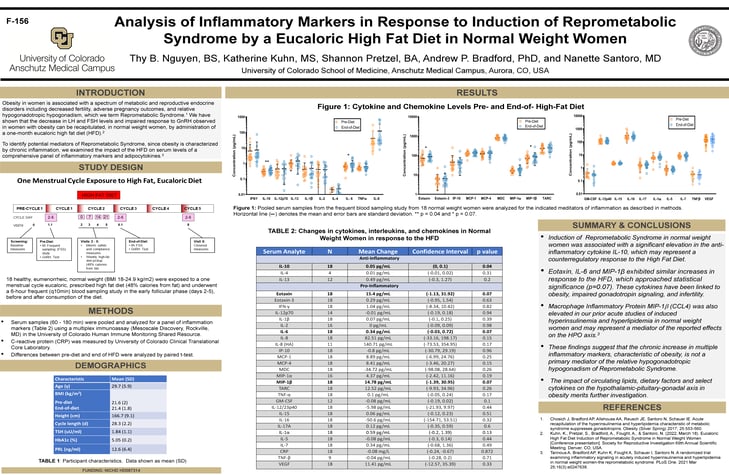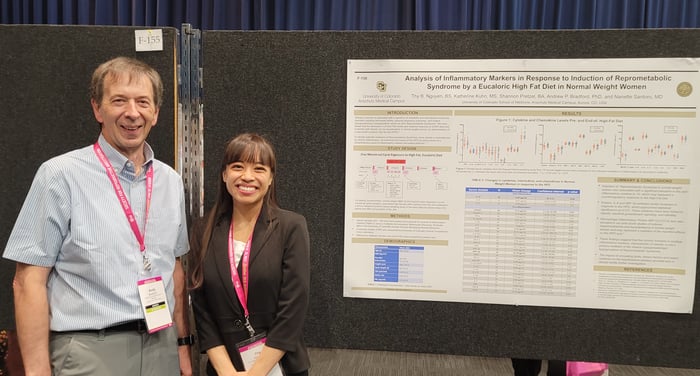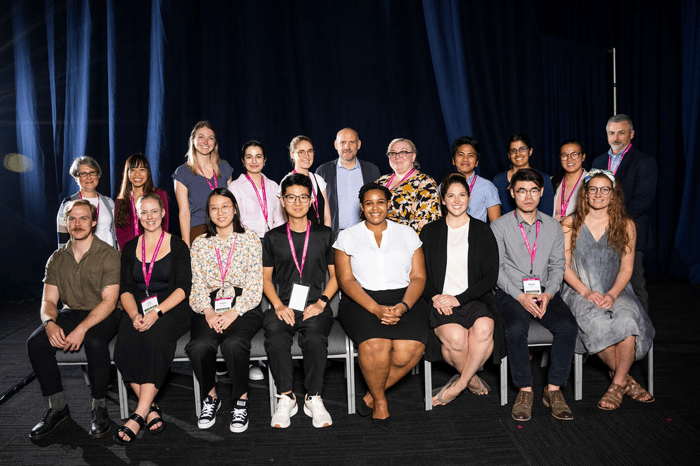Thy Nguyen’s passion for medicine is woven from many separate threads – interests in women’s health and community health, in social justice and health equity, and a recognition that complications during pregnancy and infanthood can have long-term impacts on health outcomes.
These varied interests came together when she began working with Nanette Santoro, MD, professor and head of the Department of Obstetrics and Gynecology in the University of Colorado School of Medicine. In particular, Nguyen, who will begin her fourth year of medical studies this summer, delved into research studying the mechanisms by which obesity is associated with relative infertility in women.
At the recent Society for Reproductive Investigation annual meeting in Brisbane, Australia, Nguyen earned a Best New Investigator Poster Presentation Award for presenting research analyzing inflammatory markers related to a high-fat diet in normal weight women.

Poster of Thy Nguyen's research from the Society for Reproductive Investigation annual meeting.
“This was part of a larger, ongoing study that Dr. Santoro has been working on for a long time, so it’s been such an honor that I could join this research and work with her,” Nguyen says. “I’m also really grateful that I was able to attend the conference, and in a year when it was held internationally.”
Experience and learning
Nguyen can’t pinpoint exactly when she knew she wanted to be a doctor and a researcher, because her passions grew from a lifetime of experience and learning.
Her parents fled Vietnam by boat, emigrating to the United States after the Vietnam War and settling in Mesa, Arizona. They worked hard as nail technicians and educated Nguyen and her sister “about our privilege growing up in the U.S. and how to use that to benefit our community and just the community at large,” Nguyen says. “Growing up, I didn’t think much about being a doctor, but I always had the view that whatever career I chose, I needed to use my privilege and my voice to help my community as much as I can.”
On a field trip to Washington, D.C. during her junior year of high school – her first experience leaving Arizona – she fell in love with the area and only applied to colleges in Virginia. She studied biology with a specialization in environmental and biological conservation at the University of Virginia, and in 2013 was part of a civil engineering team investigating the effects of a water purification system in Limpopo, South Africa.
“I was really interested in learning how exposures to water-borne pathogens could affect community health, and from there I became really interested in human development and how community health can have significant impacts on human development,” Nguyen explains. “I think that experience just really started my interested in research in general.”
Following graduation in 2014, she worked as a research assistant in Virginia and a medical assistant at an OB/GYN practice in Texas before beginning a premedical program at the Harvard Extension School. While in Boston, she volunteered playing guitar and singing for pediatric patients and their families at a children’s hospital, and as a teaching assistant working with incarcerated individuals.
The decision to pursue a medical education was the natural next step in her journey, and she became a member of the CU School of Medicine class of 2024 in the research track.
Focusing on inflammation
As part of the research track, medical students work with a faculty mentor to build a research plan, which they carry out through their four years of medical school. Nguyen has worked with Santoro through her years of medical school, including on the research she presented in Australia.
“The research that I’ve been primarily doing with Dr. Santoro is investigating the effects of a one-month high-fat diet in women with normal weight, and how that affects inflammatory markers,” Nguyen explains. “Obesity is thought of as a state of chronic inflammation, and the thought also is that obesity is associated with infertility in women. We’ve been studying whether the fat component in a high-fat diet could affect inflammatory markers that would ultimately affect the brain and hormones.”
Nguyen and her co-researchers have focused on cytokines, a broad category of small proteins that can play a significant role in the interactions and communication between cells; they also can help control inflammation.

Thy Nguyen (right) with Andy Bradford, PhD, associate professor of reproductive science in the CU School of Medicine, at her poster presentation.
In the research Nguyen presented in Australia, she and her co-researchers studied 18 women with normal weight through several menstrual cycles. For one month, research participants could only eat a prescribed eucaloric, high-fat diet. The researchers sampled their blood before and after that month to learn how their cytokine levels might be affected, but also the reproductive hormones LH and FSH.
“In terms of the research I was presenting for this conference, we did see an increase in anti-inflammatory cytokines, which was interesting,” Nguyen says. “One theory is that it could be the body’s way of trying to compensate for a high-fat diet. We also saw small increases in three other pro-inflammatory cytokines that have been described in the literature as increasing in states of obesity and are associated with infertility.”
Working toward equal access
Nguyen will continue working in this area of research during her upcoming fourth year of medical school, as well as in other OB/GYN-associated opportunities. During her time in the CU School of Medicine she has served as co-president of the campus American Medical Women’s Association chapter, and helped start a labor and delivery observership program at Denver Health that pairs medical students with clinicians. She also has volunteered to provide free gynecological care to women who don’t have insurance.

Thy Nguyen (back row, second from left) with other Best New Investigator Poster Presentation Award winners.
While Nguyen knows that she wants to pursue an OB/GYN residency and build her career in that area of medicine, she is keeping an open view of where that may take her.
“I’d love to find a way to go back to my roots as a Vietnamese American, and I think it would be amazing to be able to practice in both the U.S. and Vietnam,” she says. “Whatever I do, I’m so grateful that I’ve had really good role models in research and education, and through my whole life. My parents have always worked really, really hard, so it’s important to me to honor that by giving back to my community and working to ensure that people have equal access to care and equal opportunities.”



